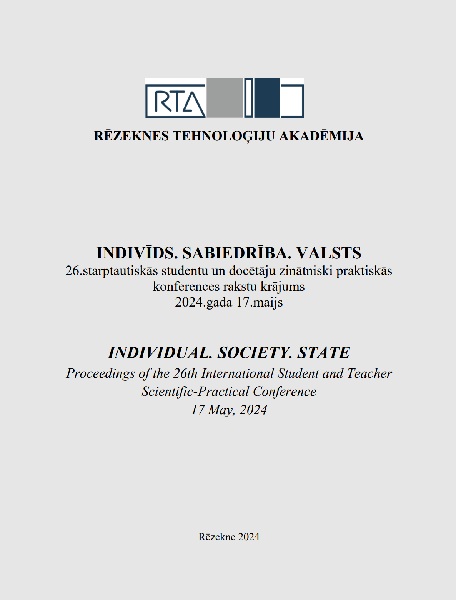MINIMUM WAGE IN THE BALTICS
DOI:
https://doi.org/10.17770/iss2024.8340Keywords:
Baltics, economy, Estonia, immigration, inflation, Latvia, Lithuania, minimum wage, price changes, redundancy, researchAbstract
The topic being analyzed in this article is Minimum wages in the Baltic countries. Authors paper analyzes the effect of the rise of the minimum wages within the Baltic States, particularly in Lithuania. Authors utilized SurveyMonkey website to aid in obtaining information about the effect of the minimum wage in Lithuania- particularly to do with price changes, redundancy as well as differences in the effect of minimum wage with respect to differing genders as well as ages and wage bands. Higher minimum wages, despite being controversial, are observed to be beneficial for the economy due to their effects on immigration and the perception of locals on their ability to cope with prices rising as well as their perception on experiencing the benefits of minimum wages increasing. Upon completion of survey, authors used SPSS software to effectively analyze results and determine any correlations.
References
Álvarez, R., & Fuentes, R. (2018). Minimum Wage and Productivity: Evidence from Chilean Manufacturing Plants. Economic Development & Cultural Change, 67(1), 193–224. https://doi.org/10.1086/697557
Anderson, W. (2021). Young workers harmed the most by minimum wage increases. Mackinac Center. https://www.mackinac.org/young-workers-harmed-the-most-by-minimum-wage-increases
Autor, D. H., Manning, A., & Smith, C. L. (2016). The Contribution of the Minimum Wage to US Wage Inequality over Three Decades: A Reassessment. American Economic Journal: Applied Economics, 8 (1), 58–99. DOI: 10.1257/app.20140073
Bittner, J. (2023). How Do Changes in the Minimum Wage Affect Household Consumption? Statistika: Statistics & Economy Journal, 103(1), 5–29. https://doi.org/10.54694/stat.2022.23
Congressional Digest. (2021). Cons of Minimum Wage. Congressional Digest, 100(4), 19–21. https://congressionaldigest.com/issue/federal-minimum-wage/indexing-the-minimum-wage/
Doh, T., & Van der Meer, L. (2023). The Employment Effect of an Increase in the National Minimum Wage: Review of International Evidence. Economic Review, 108(2), 47–61.
Dube, A. (2019). Minimum Wages and the Distribution of Family Incomes. American Economic Journal: Applied Economics, 11 (4): 268–304. DOI: 10.1257/app.20170085
Edo, A., & Rapoport, H. (2019). Minimum Wages and the Labor Market Effects of Immigration. Labour Economics, 61, 101753. https://doi.org/10.1016/j.labeco.2019.101753
Fahimullah, F., Geng, Y., Hardy, B., Muhammad, D., & Wilkins, J. (2019). Earnings, EITC, and Employment Responses to a $15 Minimum Wage: Will Low-Income Workers Be Better Off? Economic Development Quarterly, 33(4). https://doi.org/10.1177/0891242419880269
Ferraro, S., Meriküll, J., & Staehr, K. (2018). Minimum Wages and the Wage Distribution in Estonia. Applied Economics, 50(49), 5253-5268. https://doi.org/10.1080/00036846.2018.1486017
Freeman, S. (1996). The Payments System, Liquidity, and Rediscounting. The American Economic Review, 86(5), 1126-1138. https://www.jstor.org/stable/2118282
Garcia-Louzao, J., & Tarasonis, L. (2023). Wage and Employment Impact of Minimum Wage: Evidence from Lithuania. Journal of Comparative Economics, 51(2), 592–609. https://doi.org/10.1016/j.jce.2022.12.002
Huh, J. (2023). Journal of Advertising Research Quality and Ethics Guidelines. Journal of Advertising, 52(4), 483–485. https://doi.org/10.1080/00913367.2023.2227015
Kabátek, J. (2021). Happy Birthday, You’re Fired! Effects of an Age-Dependent Minimum Wage on Youth Employment Flows in the Netherlands. ILR Review, 74(4), 1008–1035. https://doi.org/10.1177/0019793919897914
Lee, T. W., Mitchell, T. R., & Sablynski, C. J. (1999). Qualitative Research in Organizational and Vocational Psychology, 1979–1999. Journal of Vocational Behavior, 55(2), 161-187. https://doi.org/10.1006/jvbe.1999.1707
Malloy, L.C. (2020). The Minimum Wage, Bargaining Power, and the Top Income Share. Forum for Social Economics, 49(1), 75-98.
Mander, J. (2023). Qualitative & Quantitative Research Methods. GWI. https://blog.gwi.com/trends/ qualitative-vs-quantitative/
Neumark, D., Schweitzer, M., & Wascher, W. (2004). Minimum Wage Effects throughout the Wage Distribution. Journal of Human Resources, XXXIX (2), 425-450. https://doi.org/10.3368/jhr.XXXIX.2.425
Põder, K., & Kerem, K. (2011). Social Models" in a European Comparison Convergence or Divergence? Eastern European Economics, 49(5), 55-74. https://doi.org/10.2753/EEE0012-8775490503
Raosoft. (2023). Survey Quota Site. http://www.raosoft.com/samplesize.html.
Stewart, M. B. (2012). Wage Inequality, Minimum Wage Effects, and Spillovers. Oxford Economic Papers, 64(4), 616–634. https://doi.org/10.1093/oep/gps003
Trading Economics. (2023a). Latvia Gross Minimum Monthly Wage. https://tradingeconomics.com/ latvia/minimum-wages
Trading Economics. (2023b). Lithuania Gross Minimum Monthly Wage. https://tradingeconomics.com/ lithuania/minimum-wages
Trading Economics. (2023c). Estonia Gross Minimum Monthly Wage. https://tradingeconomics.com/ estonia/minimum-wages
Vargas Domínguez, J. (2023). The Construction of the Minimum Wage and Nutrition in Mexico in the Early 20th Century. Historia Crítica, 87, 101–125. https://journals.openedition.org/histcrit/5584



